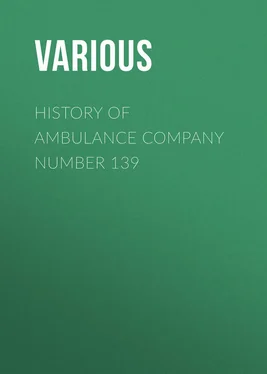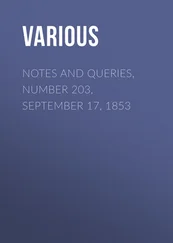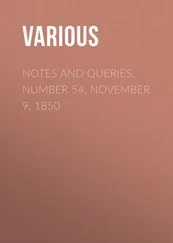Various - History of Ambulance Company Number 139
Здесь есть возможность читать онлайн «Various - History of Ambulance Company Number 139» — ознакомительный отрывок электронной книги совершенно бесплатно, а после прочтения отрывка купить полную версию. В некоторых случаях можно слушать аудио, скачать через торрент в формате fb2 и присутствует краткое содержание. Жанр: Медицина, История, foreign_edu, на английском языке. Описание произведения, (предисловие) а так же отзывы посетителей доступны на портале библиотеки ЛибКат.
- Название:History of Ambulance Company Number 139
- Автор:
- Жанр:
- Год:неизвестен
- ISBN:нет данных
- Рейтинг книги:4 / 5. Голосов: 1
-
Избранное:Добавить в избранное
- Отзывы:
-
Ваша оценка:
- 80
- 1
- 2
- 3
- 4
- 5
History of Ambulance Company Number 139: краткое содержание, описание и аннотация
Предлагаем к чтению аннотацию, описание, краткое содержание или предисловие (зависит от того, что написал сам автор книги «History of Ambulance Company Number 139»). Если вы не нашли необходимую информацию о книге — напишите в комментариях, мы постараемся отыскать её.
History of Ambulance Company Number 139 — читать онлайн ознакомительный отрывок
Ниже представлен текст книги, разбитый по страницам. Система сохранения места последней прочитанной страницы, позволяет с удобством читать онлайн бесплатно книгу «History of Ambulance Company Number 139», без необходимости каждый раз заново искать на чём Вы остановились. Поставьте закладку, и сможете в любой момент перейти на страницу, на которой закончили чтение.
Интервал:
Закладка:
We had always been told that England was famous for her bounteous feeds, and after all the bully beef we had consumed for our "Uncle," we thought we were entitled to one of those dinners of roast suckling pig and plum pudding. But alas, we were badly disappointed, because in place of the former we had a piece of cheese, the size of which wouldn't be an inducement even to a starved rat, and in place of the latter, we ate a bit of salt pork.
During our brief stay at Camp Woodley, we visited many historical buildings and places. Among these was the old Abbey at Romsey, built in the eleventh century, the walls of which plainly showed the ball marks of Oliver Cromwell's siege against it. The pews in the Abbey were the same old benches of old, and the altar was the work of an ancient artist. Around the walls were carved the epitaphs and names of those who were buried in its stately walls. Along with the tombs of the old forefathers who had fought with the armor and lance were the tombs of the late heroes, who fought with the methods of modern times. We signed our names in the visitors book, along with King George and Ex-Kaiser Wilhelm.
Our hikes in the morning were enjoyed by everyone, over well kept roads shaded from the hot sun by large over-hanging trees, the same old trees and the same old Sherwood forest that Robin Hood knew so well. But as Roger Knight says, "You can't eat scenery!"
After an enjoyable five days, spent in doing nothing much, we donned our packs again and started for the Channel, a distance of twelve miles. While walking thru the streets of Southampton, our throats parched and our feet sore, we were cheered time and again by the women and children, and many ran alongside of the marching column serving us cool water. We sighed as we had to pass Ale Shops just as if they weren't there. About noon we stopped at a Base Hospital to eat our picnic luncheon – (Bully beef).
Our first big thrill of "La Guerre" came when we saw some real live Boche prisoners working on the roads. We watched them as a little boy watches the elephant at the circus. One of the boys asked them, in German, how they liked England, and they said they liked it much better than fighting.
After our slight repast, we again took up our yoke, and did one hundred and twenty per until we reached the docks at Southampton.
FROM SOUTHAMPTON TO LE HAVRE
On the dock at Southampton, the British Y. M. C. A. operated a canteen, selling hot coffee, cakes without sugar, and ginger bread made of ginger and water. The supply lasted about fifteen minutes, as we were one hungry bunch.
We boarded the "Archangel," a small passenger boat, about 9 P. M. on the sixth of June. In peace times the "Archangel" was used as a pleasure steamer, but was converted into a troop ship to ply between Southampton and Le Havre. It had three decks, which accommodated about 325 men each. We donned our life-belts, as usual, and tried to make ourselves comfortable, but like all troop ships, that was impossible. The men tried sleeping on deck, but it turned too cold, and they tried below deck. Some were sleeping in the once "state-rooms," but they were too small to accommodate all, so the rest slept in gang-ways, on chairs, benches and barrack bags. We were tired in body but our spirits were high, and we wanted to see the front, so we lay down where we happened to be, using our life-belts as pillows. While pulling out into the harbor, we saw ships in dry dock with large holes in their hulls, others with nothing above water but the masts, all caused by the submarines. And when the little speed demon raised anchor and slipped out of the harbor, we were all fast asleep, never dreaming of what lay before us in France, and not caring a great deal either. We waited in the outside harbor until dark, or about 10 o'clock, and then started our trip across the channel. The boat made very good time, and the trip was uneventful.
At about 7 A. M. we were called to breakfast, which consisted of the customary bully-beef, coffee and hard-tack, and upon coming on deck, we discovered that we were resting safely at one of the big docks of Le Havre. The sun was shining bright and hot, and after unloading and having our pictures taken by a moving picture camera, we were lined up and marched toward the city proper of Le Havre. We were a tired, disappointed bunch of men, for instead of the beautiful country we had expected, we saw a factory infested city. The docks looked more like an arsenal, with cases of ammunition everywhere, and it looked as if the whole French and English armies were working there.
On our march to the rest camp, we passed large bodies of French and Indo-Chinese laborers unloading cars, and conveying merchandise to the warehouses. It was a common sight to see two or three of them pulling a large, two-wheeled cart full of ammunition. We also passed a number of German prisoners working on the roads, with the usual "Poilu" present, with his long rifle and bayonet. It was strange to see the French carrying their guns just opposite to the way the American troops do. We saw many large caliber guns and caissons, that were back from the front for repair, also blocks of salvaged motor trucks.
We marched about five miles to American Rest Camp No. 2, and were put into an old cow-shed to sleep. It was the first billet we had in France, and while it was not the most desirable place in the world to sleep, it looked mighty good to us, as we had not had much rest since leaving Romsey, England.
We were issued meal tickets, and had English tea, war bread and cheese for breakfast, "slum" and war bread for dinner, and English tea and cheese for supper. We had a good night's sleep, but the next morning we were hiked up on a mountain, where we were issued English gas-masks. We went through a gas chamber, to see that the masks were O. K., and to give us confidence in them. About noon trucks were brought up to take us back to camp, and upon arriving there, we were given orders to roll packs and be ready to move. Every one made a trip to the Y. M. C. A. where we could buy our first American cigarettes since coming from the States. We did not know where we were going, or when we could buy more.
OUR TRIP THROUGH FRANCE TO ELOYES
At three P. M. on June the eighth we rolled our packs and started on our first venture into the mysteries of France. It took us about forty-five minutes of steady hiking through hot and dusty streets to reach the depot where we were to entrain. We found a long string of second and third class coaches waiting for us. Our barrack bags and three days rations had been loaded on two box cars by a special detail sent ahead for that purpose.
We crowded into our cars and all was ready to go. A description of a French car might help one to get a better idea of our situation. The car is only about one-half as long as an American coach and it is divided into five separate compartments. Each compartment has a window and a door on each side. There is a step on the outside running the entire length of the car. It is just below the level of the floor and one can walk from one compartment to the other if he is not afraid of falling off the car. The compartment is about large enough for four persons to ride in any degree of comfort if they have cushions to sit on; but the Railway transport officer evidently thought that there would be more room if the cushions were removed. There were eight of us to each compartment.
Конец ознакомительного фрагмента.
Текст предоставлен ООО «ЛитРес».
Прочитайте эту книгу целиком, купив полную легальную версию на ЛитРес.
Читать дальшеИнтервал:
Закладка:
Похожие книги на «History of Ambulance Company Number 139»
Представляем Вашему вниманию похожие книги на «History of Ambulance Company Number 139» списком для выбора. Мы отобрали схожую по названию и смыслу литературу в надежде предоставить читателям больше вариантов отыскать новые, интересные, ещё непрочитанные произведения.
Обсуждение, отзывы о книге «History of Ambulance Company Number 139» и просто собственные мнения читателей. Оставьте ваши комментарии, напишите, что Вы думаете о произведении, его смысле или главных героях. Укажите что конкретно понравилось, а что нет, и почему Вы так считаете.












